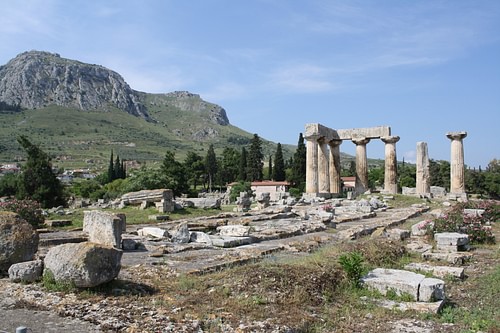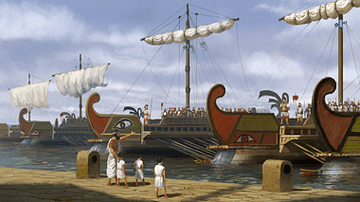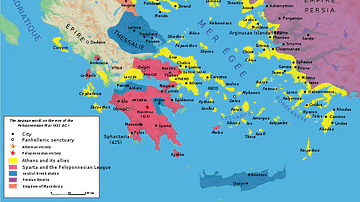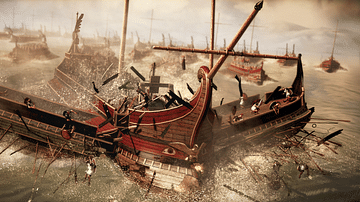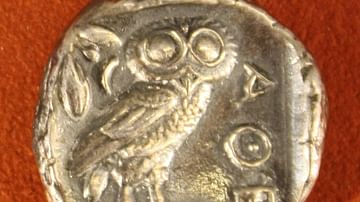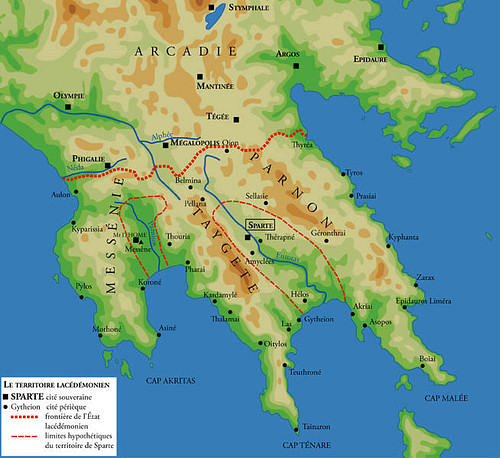
The Peloponnese is a large peninsula linked to the northern territory of Greece by the Isthmus of Corinth. To the west of the Peloponnese is the Ionian sea while to the east is the Aegean Sea. The terrain is typified by high limestone mountains, narrow coastal plains, and natural rocky harbours. The area contained several cities important in antiquity such as Mycenae, Argos, Megalopolis, Sparta, Ellis, Messene, and Corinth. The region also contains the important ancient religious sites of Olympia, Epidaurus, Isthmia, and Nemea which regularly hosted Pan-Hellenic sporting games, notably the Olympic Games.
The Bronze Age
Inhabited since prehistoric times, the name Peloponnese (in Greek Peloponessos, a term first used in the Archaic period) means 'island of Pelops' and derives from the mythical king Pelops who was thought to have unified the region. The coastal plains were exploited for agricultural production which allowed the growth of major Bronze Age settlements such as Mycenae, Argos, and Tiryns on the plain of Argos, Sparta on the Laconian plain, and Messene in the southwest. The Mycenaean civilization is noted for its expansion throughout the Aegean, its palace and tomb architecture, its fine gold artwork, and as the origin of such famous stories as the Trojan War. The civilization collapsed sometime in the 12th century BCE perhaps due to natural disaster, over-population, internal social and political unrest, invasion from foreign tribes, or a combination of all or several of these factors.
Archaic & Classical Periods
In the Archaic and Classical period Corinth, in particular, was ideally located to control lucrative land and sea trade routes connecting Greece with the wider Mediterranean. Many of the cities of the Peloponnese fought in the Persian Wars of the early 5th century BCE and some formed a loose alliance for the purposes of military action known as the Peloponnesian League (c. 505 BCE - 365 BCE). The Greeks actually referred to this alliance as 'the Lacedaemonians and their allies' after their lead city-state Sparta. Relations were not always peaceful between the members but they did effectively combine for major conflicts, notably in the Peloponnesian War of 431-404 BCE against Athens and its allies.
Ever the regional trouble-maker, Corinth formed an alliance with Argos, Boeotia, Thebes, and Athens to fight Sparta in the Corinthian Wars of 395-386 BCE. The conflict was largely fought at sea and was lost by the Corinthians. Sparta would, in turn, lose regional dominance in their disastrous defeat to Thebes at the Battle of Leuctra in 371 BCE. Even worse for the region, in 338 BCE Philip of Macedonia defeated the Greek allied forces of Athens, Thebes and Corinth in the Battle of Chaironeia. There then followed an unstable period when the region was governed by a succession of Hellenistic kings.
Hellenistic & Roman Periods
The Achaean League (also known as the Achaean Confederacy) was a federation of 12 states in the north-east of the Peloponnese, which originally formed in the 5th century BCE. Initially allies of Athens, the League came under Spartan control. In the 3rd century BCE the League expanded its territorial control, even subduing Sparta, and by the end of the century became an ally of Macedon. In the 2nd century BCE the Achaeans stood against Macedonia and signed a treaty of alliance with Rome.
In the mid-2nd century BCE Rome, tired of the region's internal disputes and provocations, destroyed Corinth (146 BCE) and the Peloponnese became, along with northern Greece, the Roman province of Achaea. Patrae (modern Patras), which could control trade routes via the western entrance to the Corinthian Gulf, became an important Roman colonia. Gythium and Methone were other important cities in this period as they were conveniently located along east-west sea-routes.
Corinth regained some of its former status when Julius Caesar founded his colony at the site in 44 BCE. The city became an important administrative and trade centre, and, following St. Paul's visit between 51 and 52 CE, Corinth became the centre of early Christianity in Greece. Corinth, and the Peloponnese in general, fell into decline when the Germanic Heruli and Alaric tribes attacked the region in 267 CE and 396 CE.
